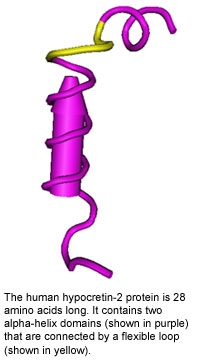This web page was produced as an assignment for Genetics 677, an undergraduate course at UW-Madison
Background

Narcolepsy is a chronic sleep disorder characterized by sudden, uncontrollable sleep attacks. Falling asleep at random, inappropriate times can be embarrassing and in some situations can even be dangerous. Nacrolepsy is associated with a shortage of a hormone called hypocretin, produced in the brain. It is estimated that around 3 million people are affected by narcolepsy, however most cases go undiagnosed (1). Because of this, it is hard to determine a specific demographic, but most say the symptoms start in the early 20's. There is currently no known cure, but treatments in the form of medication or lifestyle modifications exist that aim to combat or control the symptoms. In this project and over the course of the semester I will focus on exploring and learning all that I can of the genetics behind narcolepsy, and compare how much information I find to how much the public knows.
This youtube video is a CNN report on narcolepsy. It depicts several people who are affected by narcolepsy, and discusses the different symptoms.
The picture above depicts a graphic of the hcrtr1 gene. Courtesy of Entrez.
Narcoleptic Dogs
The domestic dog (or Canis familiaris) is another organism besides humans that can suffer from narcolepsy. This short youtube video clip depicts a dachshund with the disorder.
Hcrtr1's role in narcolepsy
The hypocretin receptor (HcrtR1 gene) is located on Chromosome 1. Hypocretin is a hormone produced in the lateral hypothalamus that induces wakefulness and promotes food intake, and studies have shown that organisms with narcolepsy have extremely low levels of it (2). It has been observed that animals (canines, rats, and mice) with mutations in the hypocretin receptor have narcolepsy (3). The genetics of narcolepsy in humans is somewhat more complex. While a mutation in the hypocretin receptor has been found to be the cause in some human cases, in other cases the immune system seems to be at fault. In the last few months, narcolepsy has been found to be an autoimmune disease. It stems from a failure of the immune system to differentiate non-foreign cells (or "self" cells) from foreign cells. In the case of narcolepsy, it is thought that the immune system attacks neurons which produce hypocretin. Scientists have been looking into variations in the HLA (human leukocyte antigen) gene to discover the cause of this autoimmune attack (4).
I'm falling asleep from reading this... Do I have narcolepsy?
There are several symptoms caused by narcolepsy, but not all have to be present to receive a positive diagnosis: sleep attack, cataplexy, and sleep paralysis. The most well known symptom of narcolepsy is the sleep attack. A sleep attack occurs when a person falls asleep without warning. It can last anywhere from a few minutes to an hour. Cataplexy is similarly sudden in onset. It is usually brought on by strong emotions such as anger, embarrassment, and more commonly, laughter. However, rather than losing consciousness, the victim suffers weakness of muscle control of varying degrees from slurring of speech to complete muscle paralysis. Finally, another symptom is sleep paralysis. A person with sleep paralysis typically has no control over muscle function after waking from a sleeping state, or after becoming drowzy (5). If you regularly suffer from one or more of these symptoms, then you should see your physician for you very well may have narcolepsy.
References:
1) Narcolepsy. Encyclopedia of Mental Disorders. (2007-2009).
http://www.minddisorders.com/Kau-Nu/Narcolepsy.html
2) Narcolepsy. National Center for Biotechnology Information. US National Library of Medicine. (2007).
http://www.ncbi.nlm.nih.gov/bookshelf/br.fcgi?book=gnd&part=narcolepsy
3) Mishima, K. et al (2008). Hypocretin receptor expression in canine and murine narcolepsy models and in hypocretin-ligand deficient human narcolepsy. Recieved from PubMed.
http://www.ncbi.nlm.nih.gov/pubmed/18714784?ordinalpos=1&itool=EntrezSystem2.PEntrez.Pubmed.Pubmed_ResultsPanel.Pubmed_MultiItemSupl.PMC_FreeArticle_ad&linkpos=1&log$=pmcad6_article
4) "Narcolepsy is an Autoimmune Disorder, New Research Shows". Science Daily. (May 8, 2009).
http://www.sciencedaily.com/releases/2009/05/090503132613.htm
5) Narcolepsy. National Institute of Neurological Disorders and Stroke. (2009).
http://www.ninds.nih.gov/disorders/narcolepsy/narcolepsy.htm
http://www.minddisorders.com/Kau-Nu/Narcolepsy.html
2) Narcolepsy. National Center for Biotechnology Information. US National Library of Medicine. (2007).
http://www.ncbi.nlm.nih.gov/bookshelf/br.fcgi?book=gnd&part=narcolepsy
3) Mishima, K. et al (2008). Hypocretin receptor expression in canine and murine narcolepsy models and in hypocretin-ligand deficient human narcolepsy. Recieved from PubMed.
http://www.ncbi.nlm.nih.gov/pubmed/18714784?ordinalpos=1&itool=EntrezSystem2.PEntrez.Pubmed.Pubmed_ResultsPanel.Pubmed_MultiItemSupl.PMC_FreeArticle_ad&linkpos=1&log$=pmcad6_article
4) "Narcolepsy is an Autoimmune Disorder, New Research Shows". Science Daily. (May 8, 2009).
http://www.sciencedaily.com/releases/2009/05/090503132613.htm
5) Narcolepsy. National Institute of Neurological Disorders and Stroke. (2009).
http://www.ninds.nih.gov/disorders/narcolepsy/narcolepsy.htm
Eric Suchy, Email: [email protected], last updated: May 15, 2010


